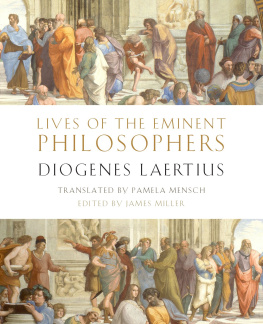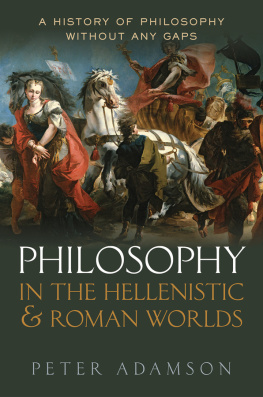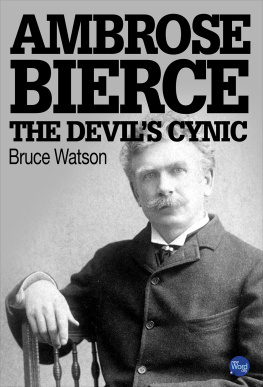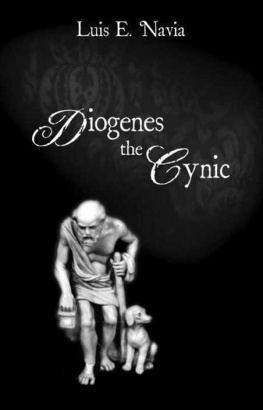
The Cynic Philosophers
from Diogenes to Julian
Translated and edited by
ROBERT DOBBIN
PENGUIN BOOKS
Contents
Life
Antisthenes speech in the Symposium of Xenophon
Display speeches by Ajax and Odysseus
1234 DIO CHRYSOSTOM
PENGUIN  CLASSICS
CLASSICS
THE CYNIC PHILOSOPHERS
ROBERT DOBBIN was born in New York City in 1958. He received a PhD in Classics from the University of California at Berkeley in 1989, and taught history and classics at college level for years. He is the author of Epictetus Discourses: Book One (1998), as well as articles on Virgil, Plato and Pythagoras. He has also translated Epictetuss Discourses and Selected Writings (2008) for Penguin Classics. Currently he works as a book editor in northern California.
Abbreviations
| Ad Lucil. epist. | Ad Lucilium epistulae |
| Anth. Pal. | Anthologia Palatina or Palatine Anthology |
| Arist. Rh. | Aristotles Rhetoric |
| Benef. | De beneficiis |
| Cic. | Cicero |
| Codex florent. of John Damasc. | Codex Florentinus of St John of Damascus |
| col. | column |
| comm. in Epict. enchir. | In Epicteti enchiridion commentarium |
| DK | Die Fragmente der Vorsakratiker, eds H. Diels and W. Kranz (Berlin 1954), 3 volumes |
| DL | Diogenes Laertius, Lives of the Ancient Philosophers |
| De off. | De officiis |
| Gnom.. | Gnomologium Parisinum |
| Gnomol. Vat. | Gnomologium Vaticanum |
| Hercher | R. Hercher, Epistolographi Graeci (Paris 1873). |
| Il. | Iliad |
| In Epist. I ad Corinth. homil. | In Epistulam primam ad Corinthios homilia |
| Inst. epit. | Institutionum epitome |
| Joann. Chrysost. | Joannes Chrysostomus |
| Mem. | Memorabilia |
| Od. | Odyssey |
| Orat. ad Graec. | Oratio ad Graecos |
| Or. | Oration |
| Pl. | Plato |
| Plut. | Plutarch |
| Prov. | De Providentia |
| Sen. | Seneca |
| Simplic. | Simplicius |
| Smp. | Symposium |
| SSR | G. Giannantoni, Socratis et Socraticorum Reliquiae (Naples 1990), 4 volumes |
| Stob. | Stobaeus |
| Suid. | Suidas or The Suda |
| TD | The Tusculan Disputations |
| Xen. | Xenophon |
Square brackets [ ] around a name indicate that the associated work is spurious, that is, probably not written by the accredited author but by someone else whose identity is uncertain. Ellipses between square brackets indicate that the passage has been abridged in translation. Text between < > (less than and greater than symbols) indicates that a lacuna has been filled with a phrase or sentence supplied exempli gratia.
Introduction
In his Rhetoric Aristotle cites notable instances of metaphoric language among his contemporaries. The Dog, he reports, used to say that taverns were the mess halls of the Athenians. With this oblique reference, the Dog (Greek cyn, related to English canine) and by extension Cynicism, the movement the Dog did most to inaugurate, make their first appearance in the written record. The Dog is Diogenes of Sinope. Like many of the aphorisms (chreiai) transmitted under his name and the names of other members of the dog pack, it is typically no more than a sardonic barb. But it is eloquent of the speakers moral stance its style invariably wry, even cynical (with a small c) in the contemporary sense of the word. With his analogy, the Dog intends a contrast between the Spartan regimen and the Athenians more relaxed mores, which included meals taken not in military-style barracks, but either in private houses or, more often, in public inns. Now, an abundance of restaurants may recommend a city to tourists. But to the Dog it seemed symptomatic of Athens increasingly lax habits especially when Sparta and its stern culture is adduced as a foil.
That Aristotle could allude to him by his nickname, the Dog, without further elaboration, suggests that he was a well-known character in fourth-century Athens. Athens was Diogenes home at a time when it was well known for its distinctive personalities. The label dog cannot pass without comment, since it was no more a compliment in his own day than it is now. Nevertheless Diogenes embraced the epithet. Undoubtedly he earned it originally through his shameless behaviour, which included neglecting personal hygiene, as well ) we first have to cure ourselves of our greedy, pampered habits.
Relying on nature, as the Cynics understood it, entailed living almost entirely out of doors (unless spending the night in a wine vat qualifies as an exception), travelling the country with little protection against the elements except a heavy cloak (no tunic or undergarment, no shoes), living off lupins, pulses and other wild cereals, picking mustard to give their plain food flavour, and depending on natural springs to slake their thirst. For rest and relaxation Diogenes enjoyed nothing more than basking in the sun. And the Cynics were great ones for hunting (cf. ), never forgetting to cite the importance of the dog (by which, by implication, they drew attention to themselves) when they tired of an exclusively vegetarian diet.
CYNIC ETHICS
All ancient ethical systems identified a telos, a practical goal. Cynics agreed with just about every rival philosophy in claiming that their ethics aimed at, indeed guaranteed, happiness (eudaimonia). As a corollary they held that moral virtue was sufficient for happiness. This was not an original view; had argued for it already. The Cynics, in turn, influenced the Stoics to adopt as the foundation of their own ethics some such correspondence between virtue and happiness. Traditionally, virtue for the Greeks comprised justice, self-control (sphrosun) and courage. Plato elevated wisdom to a position of equal, even paramount, importance.
However, this will not do as a description of Cynic ethics. They promoted ideals other than the traditional virtues, qualities that hardly qualify as virtues at all: self-sufficiency, freedom, detachment, training aimed at instilling physical and moral toughness or endurance (), freedom of speech, poverty and the rest. In addition, an obscure incident early in the life of Diogenes of Sinope, its official founder, made deface the currency Cynicisms motto and mission. As generally interpreted, that amounted to what Nietzsche (a professed admirer of the Cynics) would call and in turn endorse the inversion of all values. Cynics proposed a new ethics based on reducing material needs in pursuit of self-sufficiency, abetted in part by mental and especially physical training (asksis). They renounced the pursuit of possessions, fame and power as illusory goods that had no real value in nature.
Next page







 CLASSICS
CLASSICS